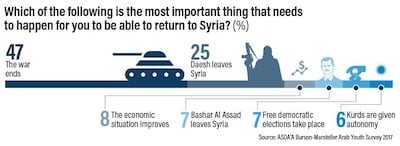Most young Syrians do not plan to return to their home permanently even when the war ends, according to a survey of refugees in Jordan and Lebanon that attempts to gauge the emotion of a generation that has been displaced.
Face-to-face interviews in refugee camps and settlements formed the framework of ‘A Voice for Young Syrian Refugees,’ released on Thursday that vocalizes the sentiment of the youth after the conflict began in 2011.
More than half of Syrian refugees aged 18 to 24 in camps in both countries said they were unlikely to permanently return to Syria in the future, compared to 42 per cent who said they were likely to return.
The sample size was 400 refugees equally divided between the camps in Jordan and Lebanon with a 50:50 male to female ratio.
“That is a surprising and a worrying statistic for a number of people because when the war ends you know how they feel. That is our top finding,” said Sunil John, chief executive of Asda’a Burson-Marsteller, which commissioned the survey.
“We want to bring these numbers to policy makers and multilateral institutions like the United Nations and the UNHCR who are trying to find a solution and trying to resettle the refugees.”
The interviews were conducted by research group PSB between February and March this year.

Mr John said an overwhelming sense of distress and frustration emerged from the statistics, underlying young people’s feeling that the world has failed them.
“The tone of the answers shows a deep sense of disappointment almost as if the world has forsaken them. Unlike youth who by nature are optimistic in that age group, here they are living in cramped conditions in camps or settlements in severe poverty,” Mr John said.
“For an entire generation that has been adrift for the last six years all they want is for the war to end. There is need for a multi-national effort to find a tangible and lasting solution to restore some of the optimism that has been lost, to do something dramatically different to build confidence in these young people to go back.”
The end of the war was the most important requirement that 47 per cent chose over President Bashar Al Assad leaving (7 per cent) or the economic situation improving (8 per cent).
A majority of 43 per cent picked a combined political and military solution to resolve the Syrian conflict compared with a smaller 27 per cent who backed a military response.
The UAE figured third in the list of countries that they would like to live in, tied with Germany at 22 per cent. Canada topped the charts at 27 per cent and the US at 23 per cent, followed by France and the UK.
The Syria survey is part of the ninth edition of the Arab Youth Survey covering 3,500 Arab nationals in 16 countries that was released in May.
The survey delves into the aspirations and concerns of the young ranging from unemployment, extremist threats to the state of the education system.




